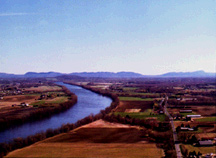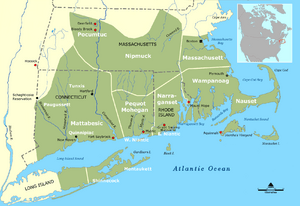Pocomtuc facts for kids

Central Connecticut River Valley, historically the main area of Pocomtuc settlement.
|
|
| Total population | |
|---|---|
| Extinct as a tribe | |
| Regions with significant populations | |
| Languages | |
| an Eastern Algonquian language | |
| Religion | |
| Indigenous religion | |
| Related ethnic groups | |
| Other Algonquian peoples |
The Pocumtuc (also called Pocomtuck or Deerfield Indians) were a Native American tribe. They lived a long time ago in the western parts of what is now Massachusetts. They were an important group in the history of New England.
Contents
Where Did the Pocumtuc Live?
The Pocumtuc people lived in an area that is now western Massachusetts. Their main home was near where the Deerfield River and Connecticut River meet. This area is now called Franklin County. Their lands also stretched into parts of today's Hampden and Hampshire Counties in Massachusetts. They also lived in areas that are now northern Connecticut and southern Vermont.
Their most important village was also called Pocumtuck. It was located near the modern-day town of Deerfield, Massachusetts.
What Language Did They Speak?
The Pocumtuc spoke a language that is now gone. It was part of the Algonquian language family. This means it was related to languages spoken by many other Native American tribes. Their language was likely similar to those of the Wappinger and Mahican tribes. These tribes lived in the Hudson River Valley.
How Did the Pocumtuc Live?
Not a lot is known about the daily lives of the Pocumtuc people. But historians believe they lived much like other tribes in New England. They were farmers who grew important crops. These crops included maize (corn), beans, and squash.
They also hunted animals for food and fished in the Connecticut River. The Connecticut River was a very important waterway for them. It helped them travel and trade with other tribes.
A Look at Pocumtuc History
The Pocumtuc people faced many challenges after Europeans arrived. They were greatly affected by diseases like smallpox. These diseases were new to them, and they had no natural protection. Sadly, many Pocumtuc people died from these sicknesses.
They also lost many people in wars. These wars were often between the Dutch, English, and French colonists. Each side had Native American allies, and the Pocumtuc sometimes got involved.
The Pocumtuc were once allies with tribes like the Tunxis and Narragansett. They fought against Chief Uncas of the Mohegan and the Pequot tribes. Later, many of these tribes, including the Pocumtuc, joined together. They fought against the English colonists in a big conflict called King Philip's War.
After King Philip's War ended, many Pocumtuc people left their homes. They moved to a village called Schaghticoke on the Hudson River. They stayed there until a war called the Seven Years' War began in 1754.
During this time, most Pocumtuc joined and became part of the Abenaki tribes. Many moved to Saint-François-du-Lac, Quebec in Canada. Some small groups of Pocumtuc stayed in Massachusetts into the 1800s. But most either moved north or blended with other tribes and settlers. Today, many Abenaki people in New Hampshire, Vermont, and Canada have some Pocumtuc ancestors.
Famous Pocumtuc Leader
One important person from the Pocumtuc tribe was Chief Wawanotewat. He was born around 1670 and lived until about 1750. He was a very skilled warrior. He led Abenaki groups into Massachusetts even after many of his followers had left the state. A mountain in Massachusetts, Mount Greylock in the Berkshires, is named after him.
Pocumtuc Villages
Here are some villages that were connected to the Pocumtuc people:
- Agawam - This is now part of Springfield, Massachusetts. The nearby city of Agawam, Massachusetts is named after this village.
- Mayawaug - This is now West Suffield, Connecticut.
- Nameroke - This is now Enfield, Connecticut.
- Nonotuck - This is now Northampton, Massachusetts or Easthampton, Massachusetts.
- Norwottuck - This is now Hadley, Massachusetts.
- Pachasock - This is now Westfield, Massachusetts or West Springfield, Massachusetts.
- Peskeompscut - This is now Turners Falls, Massachusetts.
- Pocumtuck - This is now Deerfield, Massachusetts.
- Scitico - This is also in Enfield, Connecticut.
- Squakeag - This is now Northfield, Massachusetts.
- Woronoco or Waranoak - This is now Russell, Massachusetts or colonial Westfield, Massachusetts.
Pocumtuc in Pop Culture
The Pocumtucs are mentioned in a story by H. P. Lovecraft called The Dunwich Horror. In the story, they are thought to have built the mysterious stone circles in the hills around a fictional place called Dunwich.
 | William L. Dawson |
 | W. E. B. Du Bois |
 | Harry Belafonte |


